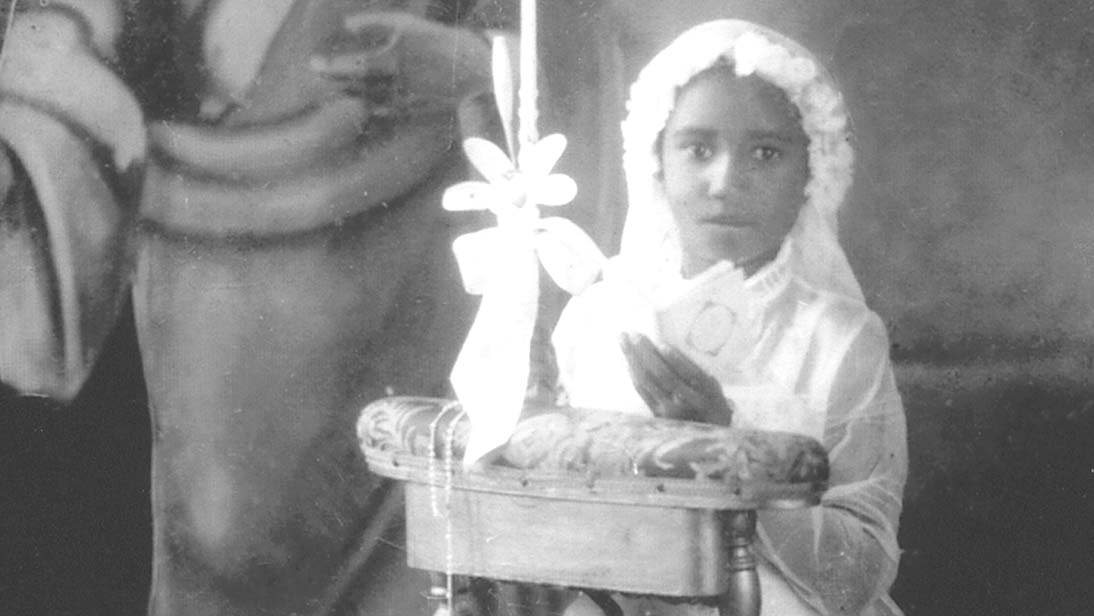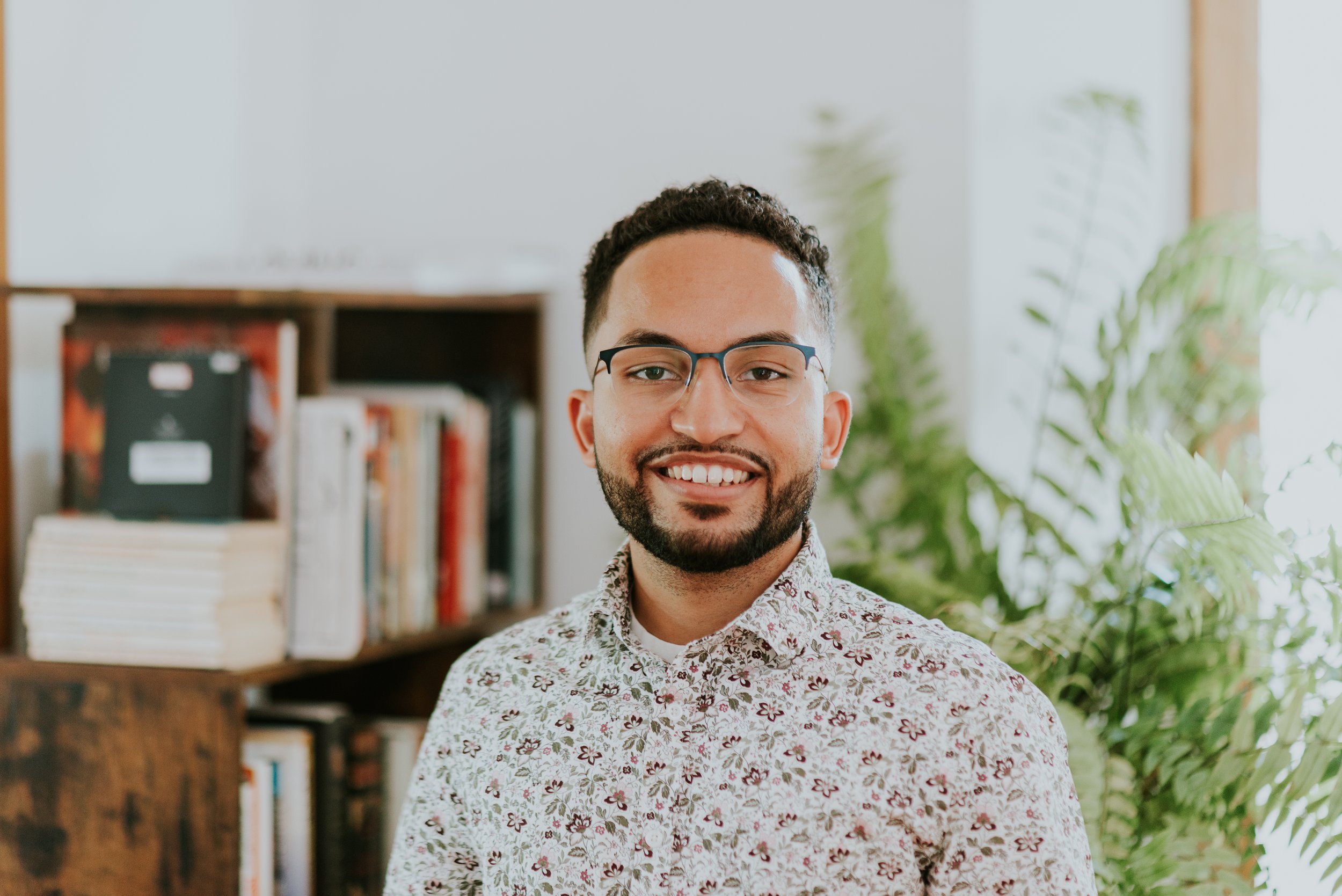Theologies That Resemble Our People
Emanuel Padilla on theology, cultural memory, and Latina memes
Future “Queen of Salsa” Celia de la Caridad Cruz Alfonso (Celia Cruz) at the time of her First Communion, Havana, Cuba, 1932. Courtesy of Omer Pardillo-Cid, celiacruz.com
My niece is really goofy. Her simper betrays the coming joke, and every time I see the glint in her eyes, she reminds me of her father, my brother. I love seeing these echoes of Abel in this amusing little human.
All of us watch children for resemblances to their parents. Parents themselves will sometimes remark with surprise when a child does something they did when they were the same age. We wonder how it is possible that children inherit these subtle ways of doing and being. But, when children and parents are estranged – through divorce, death, or abandonment – our shock at the resemblance is even greater.
How is it that this trait is here, in this child, when they have never met their parent(s)?
I ask myself this question often the more I read and study U.S. Latina/o theology. Because of the work I do, I end up stumbling into ways of thinking and doing theology with a feeling that I am guessing or improvising. Part of this unsure footing has something to do with my training in evangelical spaces and the ways in which it left me ill-equipped to deal with the questions of my people. But there are days in my studies of U.S. Latina/o theology when I notice that the way I am thinking/doing is the way Latina/o theologians and preachers have been thinking/doing all along.
I end up asking, How did this get here, in me, when my training did not encourage it?
How is it that I am doing theology this way when I have been so alienated from Latina/o traditions?
For instance, while attending an evangelical bible college, I remember a professor lecturing on the differences between ancient Alexandrian theologians (located in northern Egypt) and their counterparts in Antioch (modern-day Turkey).
“Is it possible,” I asked, “that their views on Christ were, in part, shaped by their culture?”
The professor took a sincere moment to think. His confused expression suggested that the question was unorthodox, strange to him. “I’m not sure how it could,” he responded.
Without knowing it at the time, I was already beginning to practice theological reflection latinamente by considering how culture and social location might have informed early debates about Christology.
In their Christologies, and wider doctrinal reflections, US Latina/o theologians have been attentive to the structural realities that marginalize people and produce victims. Without yet knowing this legacy, I centered my graduate thesis, titled “Seeking Zion: The Gospel and the City We Make” (Trinity International University, 2017), on the death of Tyshawn Lee. After nine-year-old Lee was murdered by gang violence, writer Mark Konkol of DNAinfo asked, “Shouldn’t it be our moral responsibility to finally make it our city's top priority to aggressively rebuild parts of Chicago that in some ways our city leaders have had a hand in helping destroy?” I took this question seriously and, through the lens of theology, chose to study the 1909 Plan for Chicago and the way the built environment had created material conditions that lead to economic and social dysfunction.
My theological writing was beginning to address issues related to the survival of my people, through a theology done in a way that my people have done it.
Years later, part of my work as president of World Outspoken (WOS) has been to encourage others to consider the legacy of US Latina/o theology and how it puts our people’s lived experience into context. In a WOS blog post titled “No Context, No Gospel” (21 September 2021), Dr. Nathan Luis Cartagena opens with:
For over fifty years, Latin@ theologians have stressed that divine-human relations, theologies, and Christian practices are culturally laden. For example, Elizabeth Conde-Frazier writes, “the nature of God is contextual and bearing witness to [the] gospel is a contextual matter.” When considering theological education, Conde-Frazier adds, “The loci of our theological education are the lakes and oceans of our lives, the intersection of the practical and the theoretical as we move toward pastoral action. Our theology never comes from a blank space.” Thus, Conde-Frazier echoes a tradition of Latin@s including C. René Padilla, Ada María Isasi-Diaz, Orlando Costas, Justo González, and Elsa Tamez.
I recently read an essay by Roman Catholic theologian Miguel H. Díaz titled “Outside the Survival of Community There is no Salvation,” which was anthologized in Building Bridges, Doing Justice: Constructing a Latino/a Ecumenical Theology (Orbis Books, 2009). He closes with an observation about the Spanish word sobreviviré and how it connotes something more than the English word, “survive.” Using Celia Cruz’s Spanish adaptation of Gloria Gaynor’s song “I Will Survive” (1978) as “Yo viviré” (2000), Díaz shows how the lyrics had to be changed to capture meaning beyond literal translation, because the Spanish word for “to survive” means more than just “bearing with hardships.” Sobreviviendo is about richly living, living above or fully, despite dehumanization. To sobrevivir is certainly to survive, but perhaps more appropriately, it is to overcome.
Literally, it could best be translated as a compound word: to sobrevivir is to over-live.
In 2014, I preached a sermon for Moody Bible Institute’s Founder’s Week on Psalm 46, and I ended it by teaching the audience the word “sobreviviré.” My explanation of the word was nearly identical to Díaz’s interpretation. At the time, I had never heard Celia’s “Yo viviré,” and I had not read any writings by Díaz.
How is it possible, then, that we all had come to similar conclusions? Is it a simple coincidence or something more like resemblance?
This echo of sobrevivir in the works of the Afro-Cuban Queen of Salsa, a Cuban theologian, and this Puerto Rican preacher reveals what theologian Jeanette Rodriguez calls “cultural memory,” or a mimetic trait passed down to all of us, perhaps without our knowing it. Culture constantly extends from person to person, generation to generation, through contact with mimetic traits, or memes. Most people think a meme is strictly a graphic or gif shared through digital platforms like social media, but a meme can also be a dicho (proverb), song, book, etc. Any imitation or replication of a cultural trait is a meme. Like genes (the biological counterpart), memes are hereditary.
Gustavo Gutiérrez – a founder of liberation theology – encouraged the Latin American church to “drink from her own wells.” Latina/o theologians in the U.S. have used the phrase to encourage younger generations to study theologies produced by and through the experience of nuestra gente (our people). Conde-Frazier, Director of the Asociación de Educación Teológica Hispana (AETH), once told me: “Our wells are primarily oral cultures…We don’t consciously pay attention to our oral culture and how it gives form to our sensing and feeling. It is captured in our preconscious thoughts as we grow up and feel our way, listening to our parents’ language.” What Rev. Dr. Conde-Frazier suggests is that our cultural memories, including words and phrases, flow into us from streams long forgotten, settling into our minds even when we do not know we are listening.
I do not remember when I learned to think and live the word sobreviviré, with all the meaning it carries for marginalized Latina/os. What I do know is how the word will continue inspiring future generations to over-live.
In her reinterpretation of Gaynor’s lyrics to “I Will Survive,” Celia Cruz sings:
Mi voz puede volar, puede atravesar
Cualquier herida, cualquier tiempo, cualquier soledad
Sin que la pueda controlar toma forma de canción
Así es mi voz que sale de mi corazón
Doy gracias a Dios por este regalo
Él me dio la voz y yo te la he dado con gusto
Rompiendo barreras voy sobreviviendo
Cruzando fronteras voy sobreviviendo
Para ti, mi gente, siempre cantaré
Te daré mi azúcar, caramba, y sobreviviré
My voice can fly, it can cross
Any wound, any time, any solitude
Beyond my control, my voice takes the shape of song
That is the voice that comes from my heart
I thank God for this gift
He gave me this voice, which I have gladly given to you
Breaking barriers, I go over-living
Crossing borders, I go over-living
For you, my people, I shall always sing
I shall give you my sugar, caramba, and I will over-live
A phrase, a song, a voice–the voice of Celia and of the God that gave her to us–echo in our hearts even when we cannot remember how this cultural memory got here. In Proverbs (1:8-9; 2:9-10), the writer tells the child: “Listen to your father’s instruction, and do not forsake your mother’s teaching … Then you will understand what is right and just and fair—every good path. For wisdom will enter your heart.”


